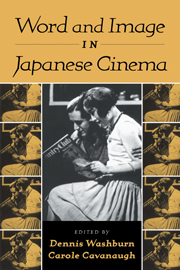Book contents
- Frontmatter
- Contents
- List of Illustrations
- Contributors
- Foreword: Outside Views of the Japanese Film
- Introduction
- PART ONE WORDING THE IMAGE/IMAGING THE WORD
- PART TWO REFLECTIONS OF IDENTITY
- PART THREE OUTSIDE THE FRAME OF CULTURE
- 12 Piss and Run: Or How Ozu Does a Number on SCAP
- 13 In the Realm of the Censors: Cultural Boundaries and the Poetics of the Forbidden
- 14 The Arrest of Time: The Mythic Transgressions of Vengeance Is Mine
- 15 The Frenzy of Metamorphosis: The Body in Japanese Pornographic Animation
- Selected Bibliography of Articles and Books in English
- Index
12 - Piss and Run: Or How Ozu Does a Number on SCAP
Published online by Cambridge University Press: 01 March 2010
- Frontmatter
- Contents
- List of Illustrations
- Contributors
- Foreword: Outside Views of the Japanese Film
- Introduction
- PART ONE WORDING THE IMAGE/IMAGING THE WORD
- PART TWO REFLECTIONS OF IDENTITY
- PART THREE OUTSIDE THE FRAME OF CULTURE
- 12 Piss and Run: Or How Ozu Does a Number on SCAP
- 13 In the Realm of the Censors: Cultural Boundaries and the Poetics of the Forbidden
- 14 The Arrest of Time: The Mythic Transgressions of Vengeance Is Mine
- 15 The Frenzy of Metamorphosis: The Body in Japanese Pornographic Animation
- Selected Bibliography of Articles and Books in English
- Index
Summary
From everything I have seen, the Japanese people have great respect for our power and will be highly sensitive to our wishes as long as that power is not seriously weakened.
- 25 October 1945 letter from “Ted” de Bary in Tokyo to “Don” Keene in TsingtaoWe, the Japanese people, acting through our duly elected representatives in the National Diet, … do proclaim that sovereign power resides with the people.
- The Constitution of Japan (1946)Who are the agents of cultural transformation in one nation when it is ruled by another? With the word culture, in its sense of both generator and custodian of social norms, we typically associate such notions as indigenous, organic, traditional: What happens to it when a value system – however well-intentioned is imposed from without, as was the case during the Allied (and principally American) Occupation of Japan from 1945 to 1952, following World War II? Are the tenets of democracy and individualism, so central to American life, universally desirable, regardless of the social context into which they are introduced? Are they superior or preferable to the “feudal” values of communal loyalty and selflessness they are called on to replace? Finally, does the very process of cultural transformation, when it assumes a blatantly alien mantle, inherently undermine its product? What is left, in other words, after the rebound from foreign rule?
These questions are raised, subtly yet unmistakably, in Ozu Yasujirô's (1903–63) brilliant but little noted A Who's Who of the Tenement (Nagaya shinshiroku, 1947), set in a working-class neighborhood of postwar Tokyo.
- Type
- Chapter
- Information
- Word and Image in Japanese Cinema , pp. 273 - 292Publisher: Cambridge University PressPrint publication year: 2000



